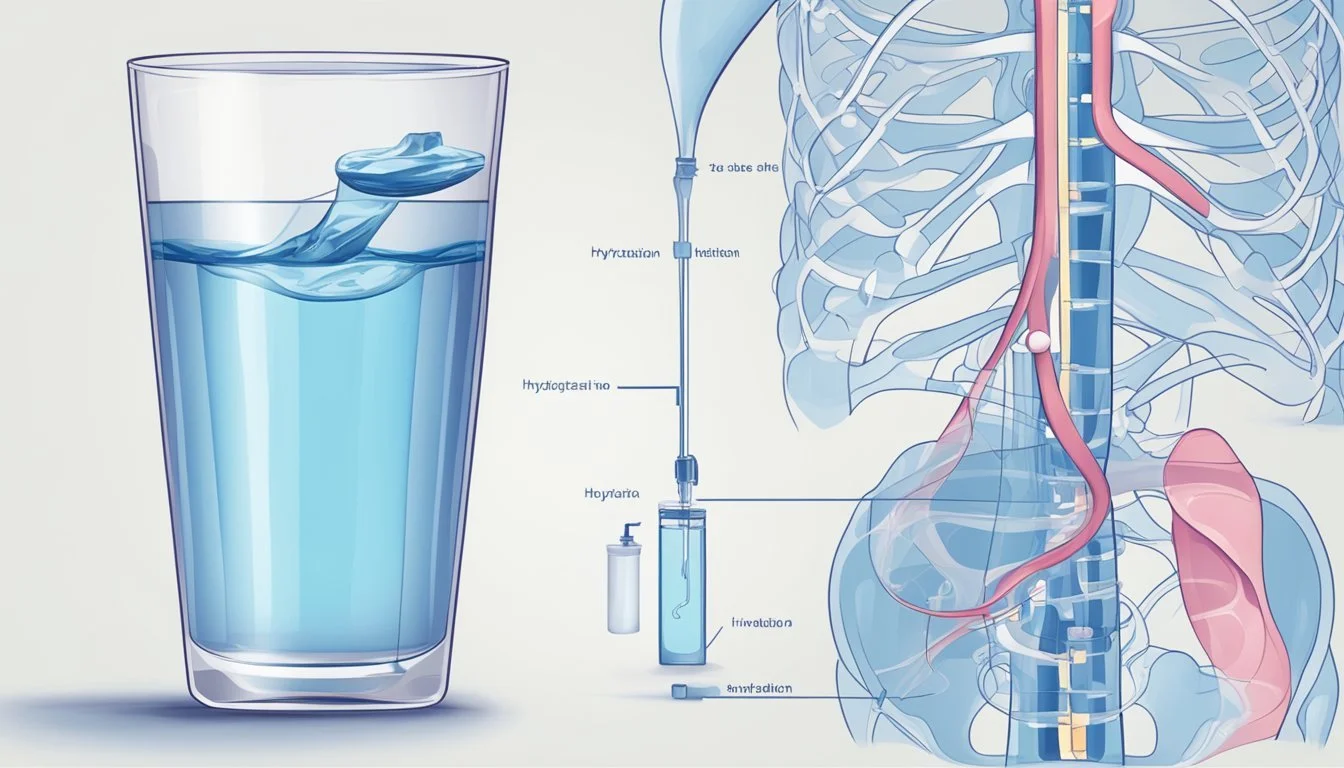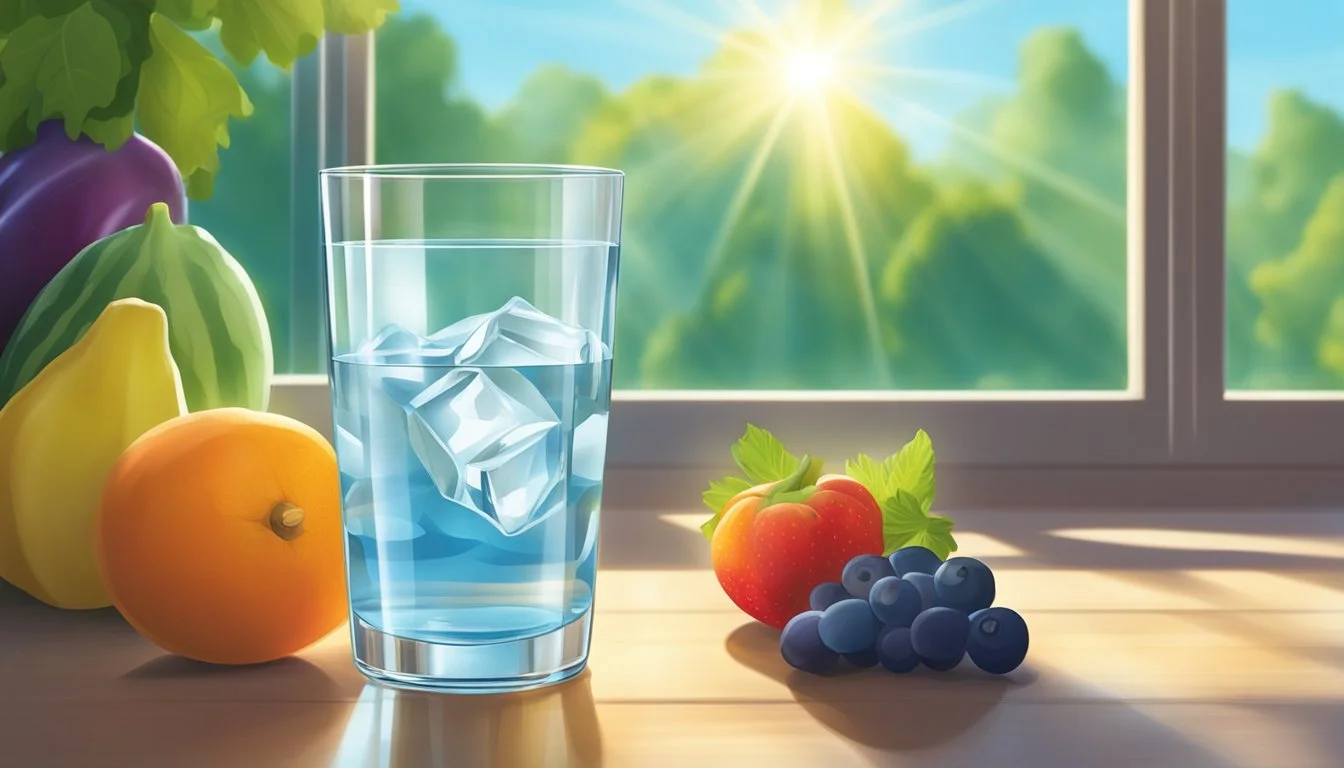The Wonders of Water
Hydration and Health Benefits Explained
Water is the lifeblood of human health, playing an integral role in keeping the body functioning properly. Comprising about 60% of an adult's body weight, water is a critical component in numerous biological processes, including temperature regulation, digestion, and the transport of nutrients and oxygen to cells. Not only does it serve as a building block for cells, but water also acts as a conduit for essential minerals and assists in flushing out waste products from the body, lightening the load on the kidneys and liver.
Hydration is another vital aspect of health, with the body's need for water signaled by the onset of thirst. This reflex is a sophisticated warning mechanism indicating when the body's water levels are suboptimal. Adequate hydration is necessary for maintaining cognitive functions, such as mood and memory, and preventing dehydration—a state that can have detrimental effects ranging from constipation to the development of kidney stones. People who engage in heavy physical activity, operate in high temperatures, or are recuperating from illness must pay closer attention to their hydration levels to avoid adverse health outcomes.
Hydration Essentials
Hydration is a fundamental aspect of human health as water is critical for various bodily functions. Adequate hydration involves maintaining a balance of fluid intake to counteract losses throughout the day. Adults are often advised to drink approximately 2 liters, or half a gallon, of water daily, but this can vary depending on individual needs and environmental factors.
Water's Role in the Body:
Regulates body temperature
Moistens tissues in the eyes, nose, and mouth
Facilitates nutrient transport to cells
Aids in waste removal through urine
Dehydration occurs when fluid losses exceed fluid intake, often due to excessive sweating, illness, or insufficient water consumption.
Symptoms can range from thirst and dry mouth to serious complications like heatstroke.
Preventative measures include drinking fluids regularly, especially water, and monitoring for signs of dehydration.
Fluid Intake Composition
While water is the most efficient hydrator, other beverages and high water-content foods contribute to total fluid intake.
Electrolytes, such as sodium and potassium, are critical for hydration as they maintain the balance of fluids in and out of cells.
Maintaining hydration is more than just drinking water; it ensures that the body's tissues and organs function correctly. The blood relies on hydration to maintain volume and blood pressure, and carry nutrients and oxygen to cells. Therefore, incorporating a balanced fluid intake in one's diet is essential for health and wellness.
Water and Human Physiology
Water is fundamental to human physiology, influencing every cell and system in the body. It is crucial for maintaining fluid balance and supporting various bodily functions.
Importance of Water for Bodily Functions
Water serves several essential roles within the human body. It is a major component of blood, which supplies cells with oxygen and nutrients while also removing waste products. It helps to regulate body temperature through perspiration, acting as a natural cooling system. In tissues, water facilitates the biochemical reactions that metabolize fats, proteins, and carbohydrates to produce energy.
The body's organs heavily rely on water to function properly. For instance, water is a primary ingredient of saliva, which is necessary for digestion and maintaining oral health. The brain uses water as a medium for transporting hormones and neurotransmitters, with adequate hydration being linked to improved mood, memory, and cognitive function.
Nutrients dissolved in water are distributed to cells.
Blood, composed largely of water, is vital for transportation of these nutrients.
Effects of Dehydration on the Body
Dehydration occurs when fluid intake is lower than fluid loss, leading to a deficiency in the body's water content. Even mild dehydration can cause problems, such as fatigue, impaired memory, and changes in mood.
Chronic dehydration might increase the risk for kidney stones and urinary tract infections due to the reduced ability to flush out waste. The kidneys regulate the water balance and filter impurities from the blood, producing urine. With inadequate water consumption, urine becomes concentrated, which can cause the mentioned health issues.
Fatigue: Dehydration often results in tiredness and lethargy.
Urine Concentration: Dark urine indicates a higher concentration of waste, a sign of inadequate hydration.
Understanding Daily Water Intake Requirements
Daily water intake recommendations can vary based on age, sex, weight, health status, and environmental conditions. However, it is commonly advised that men drink about 3.7 liters and women 2.7 liters of fluids per day. These values include fluids obtained from both beverages and food.
The sensation of thirst is the body's innate signal indicating the need for fluids; however, people should not rely solely on thirst to dictate their water consumption. Regular water intake throughout the day is necessary to support hydration and prevent the adverse effects of dehydration.
Recommended Intake:
Men: 3.7 liters per day of fluids.
Women: 2.7 liters per day of fluids.
Regular fluid intake is fundamental to maintain hydration and ensure the proper functioning of all bodily systems.
Influences on Hydration Levels
Hydration levels can fluctuate based on a variety of factors ranging from physical activity to dietary habits. Recognizing these influences is crucial for maintaining proper hydration.
Impact of Physical Activity on Hydration
When an individual engages in physical activity, the body's need for water increases due to elevated body temperature and sweating. This loss of fluids needs to be compensated by increasing water intake. For instance, during exercise, athletes may require additional fluids to offset the water lost through sweat and to prevent dehydration.
Increased exercise intensity: Leads to more sweating and higher fluid requirements.
Duration of the activity: Longer periods of exercise require more water consumption to maintain hydration levels.
The Role of Age and Gender
Age and gender significantly affect hydration levels. As people age, they may experience a decrease in their body's water content. Men and women have differing water needs, with men typically requiring a higher intake due to larger average body weight and muscle mass.
Women: Generally possess less body water than men, altering their hydration requirements.
Older adults: Often have a diminished sense of thirst and may need regular reminders to hydrate.
Diet and Hydration
Diet plays an integral role in maintaining hydration. Foods with high water content, such as fruits and vegetables, contribute to the body's water levels. Conversely, diets heavy in sodium or protein might increase the need for water to maintain balance.
High water-content foods: Include fruits like watermelon and strawberries and vegetables like cucumber and lettuce.
Sodium-rich foods: Can lead to a higher demand for water to counteract potential dehydration.
The Role of Water in Diet and Weight Management
Water is a critical component of diet and weight management strategies due to its relationship with metabolism and caloric intake, as well as its ability to influence weight loss efforts.
Hydration and Weight Loss
Adequate hydration is essential for individuals pursuing weight loss. Studies indicate that increased water intake can complement weight loss programs, as it may lead to a reduction in body fat over time. Water consumption prior to meals can create a feeling of fullness, potentially reducing caloric intake by limiting overeating. Moreover, it's beneficial to consume fruits and vegetables high in water and fiber content, which contribute to satiety without adding significant calories.
Effects of Water on Metabolism and Caloric Intake
Water has a direct effect on metabolism, as it's necessary for the efficient processing of nutrients. An increase in water consumption can temporarily boost metabolism, with some evidence suggesting that cold water may further enhance this effect due to the body's need to warm the water to body temperature. When replacing high-calorie beverages with water, individuals can significantly reduce overall caloric intake. Regular water intake can also help prevent dehydration which, if left unchecked, can lead to a decrease in metabolic rate and negatively impact health.
Nutrition, Beverages, and Hydration
Proper hydration is essential for maintaining health, and a person's choice of food and beverage plays a vital role in this process. Not only does drinking water contribute to hydration, but so do various nutritious foods and alternative beverages that contain valuable nutrients and minerals.
Choosing Hydrating Foods
Foods high in water content, such as fruits and vegetables, are excellent for maintaining hydration. They supply the body with not only water but also essential nutrients and fiber. For instance, berries, cucumbers, and lettuce are composed of over 90% water, making them especially hydrating options. Soups, which often combine water with a variety of vegetables, can also be hydrating and provide a source of minerals.
Hydration and Beverage Choices
The beverages people choose are equally important in the equation of hydration. Plain drinking water is the most effective hydrant and should be consumed regularly throughout the day. In addition to water, certain other drinks can contribute to a healthy diet:
Milk (especially low-fat or fat-free) offers calcium and potassium.
Unsweetened fortified milk alternatives can provide similar benefits as cow’s milk.
100% fruit or vegetable juices are nutrient-dense but should be consumed in moderation due to their sugar content.
Beverages like plain coffee, tea, and sparkling water can be part of a hydrating regimen, but one should be cautious of those with high caffeine or added sugars, like many soft drinks, which may lead to dehydration.
Selecting a range of beverages that contribute to hydration without excessive calories allows individuals to meet their daily fluid needs while also supporting their overall nutrition goals.
Hydration for Specific Health Conditions
Proper hydration plays a crucial role in the management and prevention of certain health conditions, directly impacting kidney function, chronic disease maintenance, and digestive health.
Hydration and Kidney Health
Kidneys regulate fluid in the body and filter out waste. Adequate hydration is key to preventing kidney stones and other kidney-related diseases. Fluids help dissolve the minerals and salts that can form stones. They recommend a daily fluid intake of about 2.5 to 3.5 liters to aid in the prevention of kidney stones and to support overall kidney health.
Managing Chronic Diseases with Hydration
Chronic diseases such as diabetes and heart disease can be influenced by hydration levels. For those with chronic conditions, maintaining proper hydration helps the body function optimally. Studies suggest that sufficient fluid intake may also reduce the risk of developing chronic diseases. Consuming a balanced amount of fluids aids in the maintenance of normal blood glucose levels and blood pressure, which is crucial in managing chronic diseases.
Hydration and Digestive Health
Proper hydration is necessary for the digestive system to process fiber effectively, aiming to prevent constipation and maintaining smooth digestion. Water enables fiber to do its job by bulking up stools and assisting them in moving through the digestive tract. Insufficient hydration can lead to constipation, as the body pulls water from stools to maintain fluid balance, making them harder and more difficult to pass. In addition, staying hydrated may decrease the incidence of urinary tract infections by flushing bacteria from the urinary tract.
Behavioral Factors and Hydration
When considering hydration and health, understanding the behavioral factors that influence water consumption is crucial. These factors can affect an individual's daily water intake and ultimately their overall hydration status, which is linked to cognitive function and mood.
Understanding Thirst and Drinking Habits
People's ability to recognize and respond to thirst varies significantly. Thirst is the body's physiological cue signaling the need for fluids; however, personal habits can influence how one responds to this cue. For example, some individuals may routinely carry a water bottle, making it easier to satisfy thirst promptly and maintain hydration. Others might ignore thirst due to distractions, leading to inadvertent dehydration. Notably, inadequate drinking water habits can negatively impact cognitive function, mood, and attention.
Psychological Aspects of Hydration
Hydration affects more than just physical health; it also has psychological dimensions. Studies suggest that even mild dehydration can cause noticeable changes in mood, focus, and short-term memory. Proper hydration can enhance cognitive function, including aspects like memory, visual attention, and visual perception. On the other hand, stress can disrupt regular drinking habits, further highlighting the intricate relationship between hydration and mental wellbeing.
Promoting Healthy Hydration Habits
To foster better hydration behaviors, several strategies can be put into practice:
Educational interventions can teach the importance of regular water intake.
Environmental changes, such as accessible drinking fountains, can encourage more frequent drinking water behaviors.
Routine setting, like drinking water at specific times of the day or with meals, can help maintain consistent hydration levels, thereby supporting cognitive processes and reducing the risk of stress-related dehydration.
Developing and maintaining healthy hydration habits is a tangible way to support both physical and mental performance, ensuring proper hydration is more than an afterthought in daily behavior.
Myths and Misconceptions About Hydration
This section addresses common misunderstandings related to hydration and its impact on general health and illness prevention. It provides evidence-based insights to correct these misconceptions.
Debunking Hydration Myths
Myth: Everyone requires exactly eight glasses of water a day for proper hydration.
Fact: Daily water intake needs vary based on individual factors such as activity level, climate, and overall health.
Myth: Caffeinated beverages lead to dehydration.
Fact: Moderate consumption of caffeine has a minor diuretic effect that does not typically lead to dehydration.
The Truth About Hydration and Illness Prevention
Hydration and Circulation:
Adequate hydration is essential for maintaining good circulation, but it is not a cure-all for circulatory issues.
Hydration and Common Illnesses:
While staying hydrated can support the immune system, it should not be seen as a foolproof method for preventing illnesses like the flu. Drinking sufficient water can help manage symptoms like fever and headaches, and can be particularly important when the body is combating illness-related dehydration caused by diarrhea.
Practical Hydration Tips
Hydration is a crucial aspect of maintaining good health, impacting everything from physical performance to overall well-being. Ensuring proper water intake helps prevent dehydration, a condition that can negatively affect bodily functions.
Everyday Tips for Staying Hydrated
For individuals leading a regular lifestyle, staying hydrated is as simple as following a few daily habits. Dehydration can occur for anyone, but one can forestall it by integrating these practices into their routine:
Monitor Urine Color: A light yellow, almost clear, color indicates proper hydration, whereas darker urine suggests a need for increased water intake.
Begin with Water: Drink a glass of water upon waking and before each meal to help with both hydration and calorie control.
Carry a Water Bottle: Having a water bottle at hand encourages continuous sipping throughout the day, rather than waiting to feel thirsty.
Incorporate Fruits and Vegetables: Foods high in water content, such as cucumbers, tomatoes, oranges, and watermelons, support hydration and offer essential nutrients.
Hydration Strategies for Athletes and Active Individuals
Athletes and those engaged in frequent physical activity or exercise have to pay particular attention to their hydration needs due to increased perspiration and water loss:
Pre-Exercise Hydration: Drinking water several hours before intense activity ensures a baseline of hydration; it is recommended to then drink 8-10 ounces of water 15-20 minutes before starting.
Hydrate During Exercise: The goal is to replace water lost through sweating. One should drink 7-10 ounces of water every 10-20 minutes during exercise.
Post-Exercise Rehydration: After extensive physical activity, one must replenish fluid levels. Here, both water intake and eating foods rich in water content can help restore hydration and replenish any electrolytes lost through sweat.






